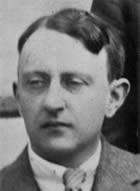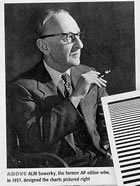|
History - People - Arthur Lindsay McRae Sowerby
Lindsay Sowerby was educated at Oxford before coming to UCL where he graduated in 1920. He probably avoided being called up for military service on account of a malformed ankle. A physical inorganic chemist, he joined the staff when Donnan was professor. We are only aware of two chemical papers. The first is a spectroscopic study with http://www.jstor.org/stable/94547
The second involves a phase rule study, this time on his own: The title suggests that he was mere cannon fodder in Donnan's comprehensive overview of phase space. His interest in chemistry faded and years later, in 1969, when his nephew Stephen Sowerby was thinking of reading chemistry at University, Lindsay advised against it saying that "there is no future in it." He had always had an interest in the earliest electronics and left UCL to help start up Cossors - a company which made radios and radiograms for the discerning. He introduced the idea of three point tracking in superheterodyne receivers in the February 1932 issue of Wireless Engineer & Experimental Wireless. In 1936, Sowerby wrote a book called 'Foundations of Wireless', published by the magazine Wireless World. The 1942 edition, which was revised by one M G Scroggie, is described as containing 'very deep principles of valve and circuit design involving algebra etc.'. By the mid 1930's as chief engineer he was earning money that only bankers realise in this day and age. With it came endless hours at the office, and he was shocked to find that his wife, Ruth, had found another man and sued for divorce. She died shortly after the divorce, and he found a new wife in Delia Hunt, a lady of determined views who ran her own dancing school. He was determined to stay married this time and moved from Cossors to being editor of the Amateur Photographer as a much lower stress job from which he retired in 1964. Steve Sowerby writes that "At the time he was head-and-shoulders above most other people in the photographic world from the technical point of view, and he was retained by Ilfords for many years as a technical consultant. He had deep links with Leica cameras (he spoke French and German fluently) and was the recipient of just about every prestigious award from the industry. He was president and honorary member of the Royal Photographic Society (based in Bath)." A search of the British Library's catalogue shows that he revised and largely rewrote 'Wall's Dictionary of Photography and Reference Book for Amateur and Professional Photographers' starting with the 14th edition in 1940 and continued to do so until 1961, by which time the book was in its 19th avatar and was now simply called 'The Dictionary of Photography'. The book can still be obtained from second hand booksellers for prices ranging between £3 and £150 (in 2001) depending on the edition.
Sowerby also contributed an introductions to 'Artificial light and photography; a treatise on artificial light sources and their application in photography', by G.D. Rieck and L.H. Verbeek in 1952, and to 'The Annual Review of the World's Photographic Art, Photograms of the Year - 1957'. Sowerby's last years were rather sad. A heavy smoker for 50 years he succumbed to lung cancer and died at last in February 1976. We are grateful to Steve Sowerby and Graham Dix for the information included on this page.
This page last modified 12 November, 2010 |


